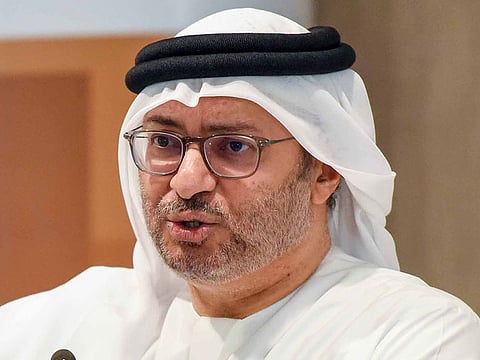Qatar's crisis strategy is in crisis: Gargash
Attempts to undermine Quartet's unity bound to fail

UAE’s Minister of State for Foreign Affairs, Anwar Gargash said that Qatar’s strategy to break out of its crisis was not working and that it was doomed to fail despite the use of fake news.
“The Qatari strategy to break out of its crisis is in crisis,” he posted on his tweet account.
“Targeting the Quartet [Saudi Arabia, the United Arab Emirates, Bahrain and Egypt] through fake news is not a strategy. The crisis has turned Qatar into a single-issue state. The same repetitive speeches, the empty halls and the lack of international attention indicate Doha's [dismal] strategy today.”
The UAE official said that attempts to erode the unity of the Quartet would not succeed and called on Qatar to do away with its “narcissism.”
“In this context, Doha is still floundering and there is no doubt that such a state is caused by despair and contradiction. The attempts to sow divisions among the four countries are [invariably] defeated by their principled position, particularly by Riyadh. Doha needs to abandon its narcissism in its search for a clear-cut solution,” he posted to his more than 933,000 followers.
Only way out of crisis for Qatar is through Riyadh
Manama: Bahrain, Saudi Arabia, the UAE and Egypt will continue their boycott of Qatar until it changes course, Bahrain’s information minister has said.
“The boycott of the Qatari regime will continue unless it ceases its aggressive approach and its support for extremist groups,” Ali Al Romaihi said.
On June 5, 2017, the four countries severed their diplomatic, trade and travel relations with Qatar after they charged Doha funded terrorism and supported extremism.
The Quartet issued a list of 13 demands and asked Qatar to comply with them as a way out of the crisis. However, Qatar rejected the charges and refused the demands, resulting in the worst diplomatic crisis to hit the region that none of the mediation efforts, led by Kuwait, could resolve.
Al Romaihi said the demands were fair and legitimate, and guaranteed peace and stability for all the countries and peoples of the region.
“The demands stem from the six principles that have already been signed by the Qatari regime in the Riyadh agreements in 2013 and 2014,” he said.
“Some of the articles stated Qatar’s commitment to combat extremism and terrorism, to stop incitement on its channels, to end supporting and funding extremist groups or providing safe havens to them, not supporting outlawed entities and refraining from interfering in the internal affairs of states. Such stances are consistent with the Gulf, Arab and international conventions and agreements.”
Al Romaihi stressed that the boycott was a sovereign legal measure that was not aimed at the people of Qatar.
“It is a means to correct the course of its Qatari regime, commit it to the agreed covenants and charters and to return it to its Gulf and Arab surroundings as an active partner on the common GCC forward-looking way,” the minister said.
“We do not want the regime to be an instrument to undermine or threaten our security or to stir up sedition and conspiracies with our nemeses and terrorist groups.”
For Al Romaihi who was speaking with Saudi daily Al Youm, Qatar can break out of its isolation only through Riyadh and within the GCC framework.
The GCC, headquartered in Riyadh, comprises Bahrain, Kuwait, Oman, Qatar, Saudi Arabia and the UAE. The alliance was set up in 1981.



